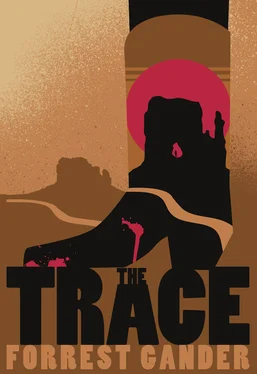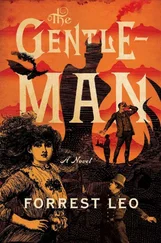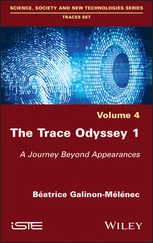Forrest Gander - The Trace
Здесь есть возможность читать онлайн «Forrest Gander - The Trace» весь текст электронной книги совершенно бесплатно (целиком полную версию без сокращений). В некоторых случаях можно слушать аудио, скачать через торрент в формате fb2 и присутствует краткое содержание. Год выпуска: 2014, Издательство: New Directions, Жанр: Современная проза, на английском языке. Описание произведения, (предисловие) а так же отзывы посетителей доступны на портале библиотеки ЛибКат.
- Название:The Trace
- Автор:
- Издательство:New Directions
- Жанр:
- Год:2014
- ISBN:нет данных
- Рейтинг книги:3 / 5. Голосов: 1
-
Избранное:Добавить в избранное
- Отзывы:
-
Ваша оценка:
- 60
- 1
- 2
- 3
- 4
- 5
The Trace: краткое содержание, описание и аннотация
Предлагаем к чтению аннотацию, описание, краткое содержание или предисловие (зависит от того, что написал сам автор книги «The Trace»). Если вы не нашли необходимую информацию о книге — напишите в комментариях, мы постараемся отыскать её.
The Trace — читать онлайн бесплатно полную книгу (весь текст) целиком
Ниже представлен текст книги, разбитый по страницам. Система сохранения места последней прочитанной страницы, позволяет с удобством читать онлайн бесплатно книгу «The Trace», без необходимости каждый раз заново искать на чём Вы остановились. Поставьте закладку, и сможете в любой момент перейти на страницу, на которой закончили чтение.
Интервал:
Закладка:
The music was on again, and they were talking about whether it was safe to buy a house in Mexico, whether it would be worth doing even though they both knew they couldn’t afford one. Hoa had finished her book on Mexico, and she decided to read to Dale for a while from a memoir she had started. It was written by a woman who was a poet, who had a very difficult time bringing up her adolescent boy, an incredible ordeal, worse than what Hoa and Dale had been through with Declan. The writer’s boy had been in a gang, had stolen his mother’s car when he felt like it, was out all night and slept all day. He only spoke to his mother to curse her. The father was nowhere. But the boy was full of painful tendernesses too. When he came home one night with a runaway friend his own age and insisted his mother let the boy live with them, she acquiesced and raised both of them for two years. She also kept adopting animals — cats and dogs — although she could scarcely afford to feed them. In fact, that was what the poet had learned. To give in, to let it come, to roll with the punches. Precisely what Hoa and Dale knew they hadn’t learned in time. Their own son’s adolescence had been one continuous, spasmodic argument.
Hoa looked up from her book. Through the spit-size unincorporated town of Langtry, Texas, they were following a black Ford Bronco with rubber bull testicles swinging from its trailer hitch. Remembering Dale had mentioned Langtry earlier, Hoa tried to restrain herself from saying anything about Judge Roy Bean other than to ask if Bean really had said that the law distinguished between a Chinaman and a man.
All the arroyos they crossed were dry, spotted with creosote bushes. It was hard to imagine how the arroyos might look — especially the wide ones — with muddy rainwater slashing through them. At Comstock, they filled up the tank again and crossed the Peco River, which was flowing and ribboned on either side with brushy greenery. Passing through Del Rio, Hoa saw a sign to Ciudad Acuña and asked if that meant Spider City.
Dale wasn’t sure what it meant — something to do with coins, he thought, but the word for spider was araña .
“You remember that hotel — wasn’t it in southwest Virginia? — so infested with spiders?” Hoa asked.
“Fuck, I’ll never forget. They didn’t want to give us our money back — ”
“Even though we didn’t even get our luggage into the room,” Hoa finished his sentence.
“Hey, is that a buzzard or a hawk?” Dale asked.
It only took her a few seconds. “It’s what people call a desert buzzard, but it’s really a hawk.”
“Got any more water?” Dale asked.
She was missing hearing from her boy.
“I drank it,” she said. “I’m ready to call it a day.”
La Esmeralda
The sheriff parked in the street at the edge of the plaza where already a crowd of some fifteen stood mutely, facing the center island with its Bienvenido a La Esmeralda sign. He slammed his car door to add authority to his arrival and approached the island. A young boy at the back of the crowd turned and looked up at him and then others turned and stepped sideways to open a corridor through themselves to the island on which had been placed, under the welcome sign and at the edge of the high curb, something unidentifiable, round, and appalling with hair. With, the sheriff realized, a face. That’s what it was, a face.
“Dios mío, cuánto cabrón,” he said under his breath.
He had entered the crowd and then he must have stopped moving forward. He felt the people around him breathing on his neck.
“Váyanse a casa,” he ordered. “Váyanse de inmediato.”
Then he had a second thought. “Quíen es?” he asked. But the people had begun to scatter and he heard them chattering, a babble of voices, and he wasn’t processing the words.
His deputy’s pickup pulled up on the other side of the island. The deputy got out, taking in the scene. Early morning. Men and women and children dispersing from the center of the plaza. The clanking of the metallic conveyor dealing tortillas over burners in the open tortilleria behind him. The scent of baking corn flour. His boss standing alone and unmoving there, like a pilgrim before a relic.
Crossing the Border Again, Piedras Negras
By the time they got to Eagle Pass, it was almost nine p.m. They were both completely worn out from sitting.
“Rendido,” Dale said.
Hoa didn’t look at him. It was darkening quickly. The lights of cars in the opposite lane were stabbing her eyes.
“We’re rendido,” Dale repeated.
Hoa didn’t say anything. She sat low in her seat.
She thought they should get a hotel on the U.S. side, but Dale argued the hotel would be cheaper in Mexico, only a few minutes away, and it would be a victory to arrive there. So they crossed into Mexico again at Puente II. The same routine, showing their passports and buying another tourist card and vehicle permit. Trucks were lined up on the bridge going north, but the way south was open. The road took them southeast along the railroad tracks and past a switching station. More trucks were lining up to go north as they merged into an insubstantial traffic pouring into the burning neon night of Piedras Negras. In less than ten minutes, they found a Quality Inn that had a little outdoor pool and a restaurant.
“Fine,” Hoa said, unbuckling her seatbelt, “if the restaurant’s still open.” Her stomach had been growling for the last two hours.
Inside the motel lobby, there was a curved reception counter facing the open doors to a restaurant. There were two restrooms and a luggage room against the far wall and a counter display of silver and turquoise jewelry. The restaurant was still open.
In the men’s room, Dale aimed his stream of urine at some toilet paper stuck to the side of the bowl while Hoa stepped into the restaurant and stood at the hostess station listening to American pop music playing from hidden loudspeakers. She didn’t recognize the band. It seemed even worse than pop music in the U.S., and she wondered if somehow music that was too pathetic to play on American stations was exported abroad — the way pesticides outlawed in the U.S. were still shipped to third-world countries. On her left, the bar counter stretched away, and through the open service hatch she saw a woman clearly not the bartender, a middle-aged woman in a long white jacket. Pulling bottles from under the bar, she was holding them up and shining a mini-flashlight into them.
The hostess appeared, a young Mexican woman with a plastic red hibiscus pinned to her high chignon.
“Just one?”
“No,” Hoa said. “There’s two of us.” She nodded her head toward the bar. “What’s that woman doing?”
“This way,” the hostess said. Maybe she hadn’t heard the question. Hoa followed her to a booth against the wall as far as possible from the bar.
“What’s the woman behind the bar doing?” Hoa asked again, sliding into the booth.
“Ah, la inspectora. Checking for — moscas de la fruta,” the hostess whispered, tight-lipped. Then, “Your waiter will be right over.” Quick smile, small teeth.
Over dinner, Hoa was too tired and depressed to talk, so she ate and she went ahead and asked Dale about the execution of Ambrose Bierce in Icamole to get him started. She was ready for any distraction at this point, even Ambrose Bierce.
“You’ve got to wait until we get to Icamole,” Dale said.
“Whose rules are those?”
She used another half a tortilla to wipe the last of the sauce from her plate. The chilaquiles had been served with red frijolitos and chicharrón in chile verde. It had sprinkled cheese and three slices of white onion on top. She swallowed the last bite, sinking back in her booth.
Читать дальшеИнтервал:
Закладка:
Похожие книги на «The Trace»
Представляем Вашему вниманию похожие книги на «The Trace» списком для выбора. Мы отобрали схожую по названию и смыслу литературу в надежде предоставить читателям больше вариантов отыскать новые, интересные, ещё непрочитанные произведения.
Обсуждение, отзывы о книге «The Trace» и просто собственные мнения читателей. Оставьте ваши комментарии, напишите, что Вы думаете о произведении, его смысле или главных героях. Укажите что конкретно понравилось, а что нет, и почему Вы так считаете.












